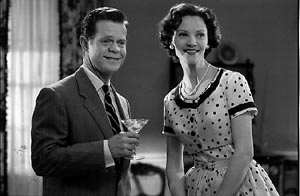

It would have been nice to come with a really catchy title for this review, but, unfortuantely for this cynical critic, Pleasantville is . . . well . . .pleasant . . . except when it is unpleasant, and then it is very unpleasant indeed, which is exactly how writer/producer/director Gary Ross wants us to see it.
A New Line release, Pleasantville works on so many levels that it is difficult to review except by beginning at the beginning, in Pleasantville.
Pleasantville is the name of a purely middle-class American suburban fantasy paradise, circa 1950-something, in which no one is unhappy, unpleasant, unemployed, un-anything, and all problems are clearly in black-and-white, and the peole are all White. For Pleasantville, you see, is a television community which lives on (and on and on . . .) in re-runs, well into the 1990's.
It is in the 1990's that vaguely dissatisfied David (Tobey Maguire) watches "Pleasantville," almost living and breathing it, to the extent that he seems to know everything there is to know about the televised community, stunning school chum Howard (Giuseppe Andrews) with his knowledge of the most trivial occurences in the lives of father and husband George (William H. Macy), wife and mother Betty (Joan Allen), their children, Mary Sue and Bud (Natalie Ramsey and Kevin Connors), and all of their friends and neighbors. This knowledge is vitally important to David, for it is the key to his winning the trivia contest being conducted in conjunction with a "Pleasantville" television marathon.
Unfortuantely for David, his twin sister Jennifer (Reese Witherspoon) is more intent upon having the television to herself and her boyfriend for a hot, hot date at home than she is in David's contest-winning plans. The two struggle for control of the remote control of the TeeVee set and the remote is destroyed. Fortunately, at that very moment a mysterious TV Repairman (Donn Knotts) arrives at their front door and, after being suitably impressed by David's knowledge of Pleasantville, offers the two teenagers a new, sophisticated remote control for their television, which they eagerly accept. In fighting over that remote control, they find themselves actually transported into Pleasantville -- and find themselves in glorious black-and-white.
Bewildered, they find that the TV Repairman has carefully selected them (David, actually) to be transported into Pleasantville, taking the places of Mary Sue and Bud. Stranded, they find themselves actually interacting with their television "parents," George and Betty, and with the whole community.
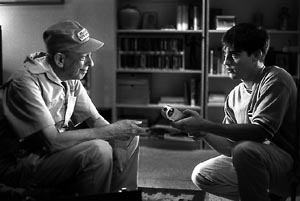
David realizes that the situation of the twins is precarious, and he pleads with Jennifer to play along with the "episode" in which they are in, and to act as if she is herself Mary Sue. Rebelling at first, Jennifer decides to play along when she realizes that playing Mary Sue means playing around with basketball star Skip (Paul Walker).
(Mind you, basketball is important in Pleasantville, because the High School basketball team has never lost a game; in fact, no one on the team ever even misses a shot. This is Pleasantville, after all: missing a basket would be something other than pleasant, and unpleasantness has never, ever occured here. For that matter, neither has rain or fire -- the Pleasantville Fire Department's sole responsibility, for example, seems to be rescuing cats from trees.)
Unfortunately for Jennifer, Skip is a true son of Pleasantville and won't even think of holding hands with Mary Sue (let alone kiss!!!) until after they are "pinned." Alone with Skip in his car on what passes for the town's "Lover's Lane," Jennifer quickly teaches Skip that one can be "pinned" in more ways than one, and she, frankly, ravishes the naive boy, to his surprise and delight, while "Bud" rushes from the diner, where he works for Mr. Johnson (Jeff Daniels), to Mr. Johnson's surprise.
The next day, David sees Skip talking to the other members of the basketball team before practice. (Bud is a team member, himself, of course!) When the Coach calls for practice to begin, Skip misses his shot; in fact, everyone on the team misses and David realizes that something is terribly amiss, and he realizes that Jennifer has stepped out of character as Mary Sue, made out with Skip and upset the delicate balance of the town.
Once begun, the spiral of unpredictable behavior spins out of control: David, reporting for work at the diner, finds Mr. Johnson in a daze. Without Bud at the diner, Mr. Johnson's routine has been thoroughly disrupted, and he finds that he cannot carry out the most basic duties of his job without Bud fulfilling his basic duties (like putting out the buns for the hamburger patties or wiping off the counter). David, as Bud, suggests to Mr. Johnson that there might be other ways to do things than they have been done previously, that it makes no difference if the hamburger patty goes on the bun before or after the cheese, that it makes no difference if he or Mr. Johnson wipes off the counter, and so on. Puzzled at first, Mr. Johnson gradually becomes emancipated from the mental slavery of his life as he discovers that he has the power of choice, and that everything need not unfold the same way day in and day out.
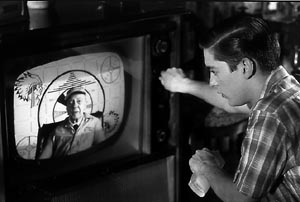
David and Jennifer have unwittingly added color to the drab lives of the people of Pleasantville, and that color begins to spread . . . literally.
At first, it's just a single rose which blossoms red instead of grey, then it's people's faces, and cars, and clothes, and, ultimately, their lives. Pleasantville, the town, ceases to be what David knew from "Pleasantville," the televsion show.
Jennifer having discovered that no one in Pleasantville knows what is outside of Pleasantville, she also discovers that the books are all blank. At least, they are except for the one she has looked at, for text has begun to appear in the pages of the library books, and "Bud" who has shown himself to be an amazing prodigy with his ability to handle the new and unexpected, is asked by Will (Erik MacArthur) and the other kids at the diner if he knows what happens after the text ends. Examining the book, David sees that it is an account of a certain Huckleberry Finn, and that it ends abruptly exactly where Jennifer had stopped reading it in their reality. When "Bud," who, as David, has read the book, flips through it, the full text appears before everyone's astonished eyes.
The influence of David and Jennifer begins to extend wildly throughout the town: lines form at the library as children, for the first time, have something to actually read, girls begin wearing tight sweaters and applying colorful makeup, cars begin to appear in vivid reds and blues, and people begin thinking for themselves and following up on Jennifer's innocent question, "What's outside of Pleasantville?"

Having established this macroscopic panorama of Pleasantville changing from black-and-white to "colored," writer/director Ross focuses in on a typical microcosm: George and Betty's home life. George, typically bourgeois, wants no change in his life or in his town, but Betty actually asks Mary Sue, "What goes on at Lover's Lane." But the role of Mary Sue is now played by Jennifer, and Jennifer proceeds to answer the question, even explaining S-E-X to Betty, who promptly faints. Nevertheless, the cat has been let out of the hat, and Betty, too, begins to change, becoming one of the town's "coloreds," and suddenly finding that she and Mr. Johnson are mutually attracted to each other, to the extent that one night George actually comes home to find no one there to greet him, and . . . HORROR OF HORRORS! . . . no dinner waiting for him, either. George's dull grey life, and that of the other dull grey men like himself, has been permanently (and, from their point of view) terribly impacted by this spread of color and "colored" thinking. What follows is not simply Pleasantville's first brush with unpleasantness, it is nightmarish, a vivid and frightening display of the grey men and their thugish young supporters enacting Pleasantville's equivalent of "Jim Crow" laws, segregation, apartheid, or call it what you will. Signs begin to appear in the black-and-white storefronts bluntly stating, "No Coloreds." David having introduced the concept of fire to Pleasantville, the library's books are burned in a holocaust, "colored" people are attacked, and the now-colorful diner is thoroughly vandalized.
Now all of this seems tame enough in a review, but what the reader must understand is that when this review speaks of color, the word is meant literally. Pleasantville exists only in black-and-white until David and Jennifer arrive and disrupt the community by introducing passions and things which are "silly . . . or sexy . . . or dangerous . . . or wild . . . or brief," whereupon the on-screen world of Pleasantville gradually acquires color before the eyes of the audience. This is done most memorably in a scene in which Betty reveals that she, too, is colored, and has only been wearing make-up to appear "normal," with only a small portion of Joan Allen's body showing color on-screen, the rest of it being in high contrast black-and-white.
Here, words fail. Only the greatest narrative writer could succesfully describe the pathos of the sight of the weeping Betty having her color covered by a tender and understanding David, doing something which "Bud" would never have been able to comprehend, much less deal with. And so it goes throughout Pleasantville, the movie. Words cannot do justice to the film's visual imagery. Pleasantville must be seen to be appreciated. Period.
Trying to sum up Pleasantville in words alone is as pointless as trying to sum up Citizen Kane in twenty-five words or less. It can be done, but why bother? One must, in the last resort, simply point to the screen and let the film and its imagery speak for itself. What Citizen Kane did for black-and-white film-making, Pleasantville does for the computer age. Pleasantville is destined to be regarded as a cinema classic. Period.
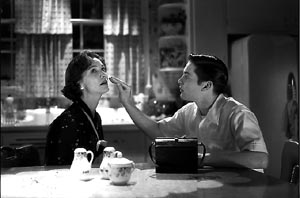
Ordinarily, this reviewer's highest rating is W8: Worth $8.00. What is a ticket to Pleasantville worth? Whatever you have to pay to make the journey. This reviewer is -- a week after seeing the film -- still trying to figure out who among its cast and crew will be nominated for Oscars(tm), but likely candidates are: writer/producer/director Gary Ross, actresses Joan Allen and Reese Witherspoon, possibly actors William H. Macy and Tobey Maguire, and certainly some combination or combinations of Cinematographer John Lindley, Production Designer Jeannine Oppewall, Editor William Goldenberg, Costume Designer Judianna Makovsky, Visual Effects Supervisor Chris Watts, Color Effects Designer Michael Southard, Key Make-Up Artist Susan A. Cabral, and so many others that the Academy of Motion Picture Arts and Sciences may have to create new categories of awards for this revolutionary piece of cinematic art.
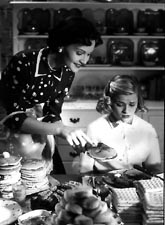
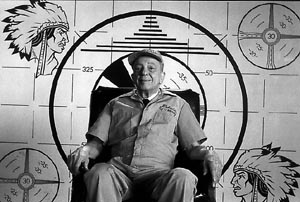
Okay, so it wasn't 1998's Titanic. When I wrote this review, Shakespeare in Love hadn't yet been released. Pleasantville is still a darned good, movie, though!
